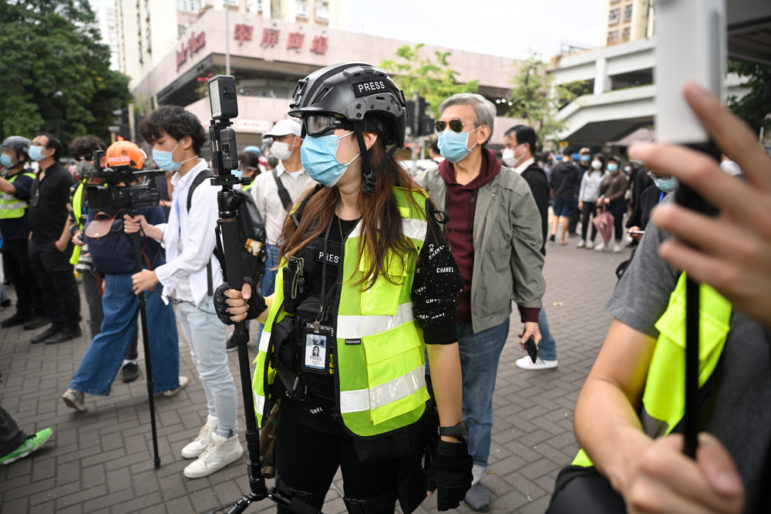

What We’re Reading: Tracking the Global Arms Trade, PPE Procurement Watch, and International Support for Whistleblowers

For this week’s Friday 5, where GIJN rounds up journalism news in English from around the world, we’re reading about the new Corruption Tracker for the international arms trade, dodgy deals in personal protective equipment procurement, and a recently launched organization to support whistleblowers legally, as well as financially.
Tracking Corruption in the Global Arms Trade (Corruption Tracker)
The World Peace Foundation, Shadow World Investigations, and the Global Net Stop the Arms Trade at the Arms Information Centre, launched the Corruption Tracker this week. The online database will include “robust allegations of corruption” in the global arms trade, with information collected by a network of journalists, academics, and activists in the field. The Tracker aims for a more transparent view into the opaque industry with a comprehensive database that includes information about individual corruption cases, as well an ability to “identify patterns across a number of deals.” It allows for an impressive simple search through overall document text and buyer and seller companies and countries.
#COVIDCrimeWatch: PPE Procurement (Global Initiative Against Transnational Organized Crime)
The latest edition of the #COVIDCrimeWatch newsletter featured stories about irregularities in the public procurement sector from around the world. With the rising number of personal protective equipment (PPE) contracts, many governments have fast-tracked accountability and procurement rules, enabling widespread abuse in the system. In addition to the newsletter the GI-TOC has also published articles about the impact of the pandemic on extortion in Central America. The previous newsletter focused on shifts in the migrant-smuggling flows and the rise in human trafficking, including forced labor, child marriage, online sexual exploitation, and the recruitment of children into gangs. You can subscribe here for upcoming newsletters.
New International Legal Advocacy for Whistleblowers (Center for Whistleblower Rights and Rewards)
Whistleblowing International launched the Center for Whistleblower Rights & Rewards, which aims to provide “complete services for citizens and employees worldwide who have information about crime, corruption, environmental violations, and other misconduct.” In addition to monetary support and legal counsel, the group will also investigate corruption and “provide assistance in holding guilty parties accountable.” According to its website, the organization will help in cases of successful reporting of bank or financial corruption, carbon emissions or air pollution, tax evasion or securities fraud, company misconduct, money laundering, bribery of public officials, commodities fraud, government contracting fraud, ocean pollution and dumping, harm to endangered species, wildlife poaching and trafficking, and illegal logging and fishing.
Global Dashboard for COVID-19 Monitoring (World Bank Blogs)
The World Bank’s Data Blog blog rolled out a global dashboard that compiles Google search data, allowing allows users to easily see terms and phrases around COVID-19. The aim is to show how the data can be used to “effectively assess the spread of the coronavirus in real-time for almost 200 countries worldwide.” Essentially, it shows how to use COVID-19 terms and phrases on Google Trends to predict pandemic surges by location. Research indicates that interest for various symptoms of coronavirus is correlated with COVID-19 cases and deaths as reported by the World Health Organization. Its Brazilian case study showed how, with the use of Google Trends data in a country-specific setting, some states experienced a spike in “I can’t smell” searches before their exponential curve of cases and deaths took off.
The Cartel Project: Exposing the Global Networks of Mexican Drug Cartels (Forbidden Stories)
A series of five investigations coordinated by Forbidden Stories — a global network of investigative journalists whose mission is to continue the work of reporters who have been threatened, censored, or killed — began its rollout this week in 25 international media outlets, including Le Monde, Radio France, The Washington Post, the Guardian, Proceso, OCCRP, South China Morning Post, Die Zeit, El País, and SVT. The Cartel Project worked across 18 countries over 10 months to investigate “global networks of Mexican drug cartels and their political connections around the world.” The outlets ran stories about Proseco’s Regina Martínez, who was beaten and then strangled to death in her own bathroom in 2012. Journalists working on the project found that, in the months before her death, Martínez had been preparing a report about thousands of individuals who had disappeared in Mexico.
 Tanya Pampalone is GIJN’s managing editor. The former executive editor of the Mail & Guardian and head of audience development at the African arm of The Conversation, Tanya contributed to Southern African Muckraking and Unbias the News. She created One Night in Snake Park, a six-part podcast and in-depth investigation on xenophobic violence in South Africa.
Tanya Pampalone is GIJN’s managing editor. The former executive editor of the Mail & Guardian and head of audience development at the African arm of The Conversation, Tanya contributed to Southern African Muckraking and Unbias the News. She created One Night in Snake Park, a six-part podcast and in-depth investigation on xenophobic violence in South Africa.









